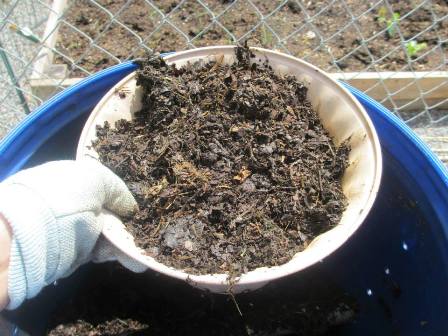“To grow healthy, productive plants you need healthy, productive soil. It is the organisms in the soil that provide the food plants need, in the form they need, when they need it.”
-Dr. Elaine Ingam, SoilFoodWeb.com
The first year we had our little backyard garden, we rented a rototiller and went to work processing the soil for planting. While this seemed like the right thing to do at the time, we quickly learned that tilling is an unnecessary extra step in raised bed gardening that can actually harm rather than help your crops grow.
While we did, in fact, enjoy a prolific first-year crop of hardy vegetables, this was likely because the soil in our garden beds was supplemented with rich, black earth we purchased from Cierich’s Pohatcong NJ Growers. These people have some of the best organic soil around, and they come with our highest recommendation, not only for great growing soil but for the fantastic organic starter plants and beauteous flowers they sell each spring and throughout the summer.
My husband Mike is a raving fan of Mike McGrath of You Bet Your Garden fame, and he informed me that we’d best educate our readers on what not to do when starting an early spring garden in NJ per McGrath’s instruction. Plus, since we sell raised garden bed frames throughout Hunterdon and Warren County NJ, we feel it’s only right to offer our web readers some sound advice that’s helped us along our own gardening journey.
So: since Mike McGrath preaches against the use of a rototiller to work the soil, we would have to echo this sentiment. But he’s not the only one. A bit of Google research quickly revealed to us that other gardeners throughout the US are also following this rule. Here’s a quick rundown of why:
Rototilling chops up the soil particles too well. It destroys plant roots that live beneath the surface of the soil, and upsets the microcosm of organisms that have been working hard to break down the soil for you – bacteria, fungi, earthworms, nemotodes, and insects, to name a few.
Rototilling actually creates a “pan” of hard soil beneath the tilled layer, which plants find difficult to push their roots through.
Rototilling can bring weed seeds up to the surface of the soil and create more weeding work for gardeners later in the season.
And of course… if you have a raised bed garden as our customers do… the main reason to NEVER till your garden beds:
Tilling is not necessary at all for raised bed gardening because raised bed gardens generally do not become compacted. This is because people do not walk on the actual garden soil where the plants grow.
So: since you shouldn’t use a tiller to get your backyard earth ready for planting, what should you do? The authors of Rebirth of the Small Family Farm recommend the pitchfork technique. This involves putting down a layer of composted soil into an already-established garden bed from last year. Use the pitchfork to stab holes down into the earth, into which the fresh composted soil will fall and mingle with what’s already there.
Our research revealed that there IS one situation where you might want to rototill your backyard for garden-planting. This is if you’re just starting out with a first-year garden, and you’ve discovered that the soil is extremely compacted and difficult to plant in. In this case, start by rototilling, then add layers of compost and some fertilizer. We recommend Espoma organic fertilizer as opposed to the chemical mixes you may find at your local nursery.
